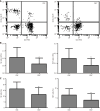Natural killer cell dysfunction is associated with colorectal cancer with severe COVID-19
- PMID: 40487965
- PMCID: PMC12142241
- DOI: 10.4251/wjgo.v17.i5.104591
Natural killer cell dysfunction is associated with colorectal cancer with severe COVID-19
Abstract
Background: Severe acute respiratory syndrome coronavirus 2 induced coronavirus disease 2019 (COVID-19) has posed a great challenge to public health worldwide and also increased susceptibility to colorectal cancer (CRC). Natural killer (NK) cells serve as the first line of defense in the host's innate immune system, performing natural killing functions and mediating cytotoxicity against tumors and viruses. Therefore, a better understanding of NK cell cytotoxicity may facilitate the development of treatment strategies for CRC-associated with COVID-19.
Aim: To investigate the cytotoxic killing function of peripheral NK cells in patients with CRC and severe COVID-19 (CRC+ patients).
Methods: The percentages of circulating NK and NKT cells in CRC+ and age-matched patients with CRC were analyzed using flow cytometry. NK cell cytotoxic activity (NKCA) and corresponding NK cytotoxic factor (NKCF) activity in peripheral blood mononuclear cells were evaluated using a Real-Time Cell Analyzer.
Results: The numbers and percentage of peripheral NK and NKT cells in patients with CRC+ were lower than those in patients with CRC. Additionally, compared to patients with CRC, those with CRC+ had lower levels of NKCA and NKCF activity in lysed K562 cells. Positive correlations were observed between NKCA and NK cell numbers, NKCA and NK cell percentages, NKCF activity, and NK cell percentages in patients with CRC+. Furthermore, a negative correlation was observed between NKCA and the severity of COVID-19 in patients with CRC. The area under the receiver operating characteristic curve for NKCA was greater than those for the other indices.
Conclusion: CRC+ is associated with lower levels of peripheral NK cells and impaired natural cytotoxicity, contributing to the immunopathogenesis of severe COVID-19 rather than immune control.
Keywords: COVID-19; Colorectal cancer; Natural cytotoxicity; Natural killer cells; Natural killer cytotoxic factor.
©The Author(s) 2025. Published by Baishideng Publishing Group Inc. All rights reserved.
Conflict of interest statement
Conflict-of-interest statement: All the authors report no relevant conflicts of interest for this article.
Figures





References
-
- Paine SK, Choudhury P, Alam M, Bhattacharyya C, Pramanik S, Tripathi D, Das C, Patel V, Ghosh S, Chatterjee S, Kanta Mondal L, Basu A. Multi-faceted dysregulated immune response for COVID-19 infection explaining clinical heterogeneity. Cytokine. 2024;174:156434. - PubMed
LinkOut - more resources
Full Text Sources

